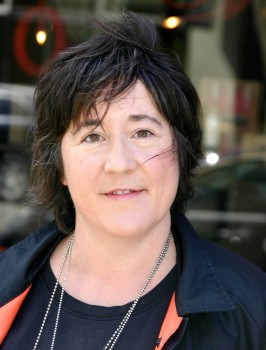Even if you don’t know her name, you’ve heard of the boundary-pushing films she’s produced: Boys Don’t Cry, Kids, One Hour Photo, Happiness, Far From Heaven, The Company, I’m Not There, Hedwig and the Angry Inch. Independent film pioneer Christine Vachon’s dabbled in TV more recently, cranking out the miniseries “Mildred Pierce” with Kate Winslet, and the Emmy-nominated TV adaptation of “This American Life.”
But Vachon is interested in the web, too. On Monday, speaking to a small group of Champlain College students, she said it was easier than ever to create works seen by the world. If they wanted in on it, she told the students, the gates are open like never before.
“I think we have to stop calling ourselves filmmakers,” she said. “I think we have to start calling ourselves content creators. For content to work — for something you will go to see in a theater, pay to download, make yourself a fan of — it has to be truly original.”
“Making content is so accessible, make content. Just keep making it,” she said. “Make as much as you can.
“And don’t focus on content that’s so focused on a theatrical lens,” she added, in response to a question about self-producing films. “I don’t think that’s as important anymore. It can be short content. You can show it on a million different platforms. You don’t have to go to a film setting.”
That’s the kind of thing that can bring the world of micro-indie producers — individuals with YouTube channels or Vimeo accounts — into the greater sphere of producers like herself, she noted.
“The real buzzword in the content-creating world right now is community, creating community,” she said. “Movies come to me all the time… that are looking for somebody to help push it, or find the last piece of money,” she said. “It’s not hard to get access to people in my world.”
Vachon’s appearance was part of a Women’s Empowerment Initiative at the college aimed at attracting and retaining more female students — Champlain’s student body is a 64 percent male. It started with a dinner with students who peppered her with career questions.
She urged students in her later evening presentation not to silo themselves in a career path, given the swiftly changing media landscape.
“I do see content adjusting itself to how we consume it,” she said. “As film – [she laughed, correcting herself] – as content makers, we have to start interrogating ourselves about what makes something theatrical.”
And even though she said she hates YouTube, she said that watching her 14-year-old daughter use it, and this piece by the young daughter of an NBC exec, forced her to reconsider it as a valuable artistic medium.
“YouTube for them is what punk rock was to me. It’s original, it’s fresh, it spoke to me, it was made for me, not my parents. They don’t get it.”
“That to me is really hopeful. I love the idea that people are just constantly figuring out new ways, different ways to tell stories with what they have. I don’t lament, at all. I’m not into vinyl. I’m like – it’s move the fuck on. It’s OVER.”
“Celluloid is over. Just like, go forward because there’s so many other great ways to tell stories. And embracing those is the only way to move forward.”
“I’m not very introspective,” she added at the close, “and I don’t really look back.”


